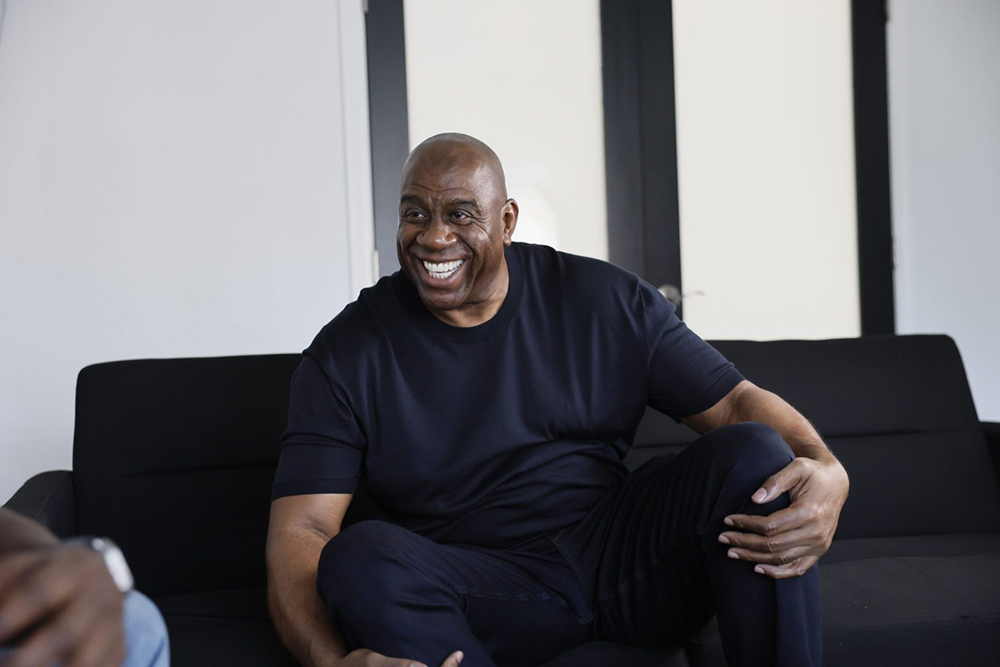
奥运选手可能是最顶尖的运动选手,但他们仍是凡人。“魔术师”小埃尔文·约翰逊警告称,如果计划不当,他们就可能一落千丈。
这位前洛杉矶湖人队的伟大球员曾五次夺得总冠军,还是“梦之队”(1992年美国男子篮球奥运会代表队)的传奇队长。在接受英国广播公司(BBC)记者凯蒂·凯(Katty Kay)采访时,这位现已退休的商人给年轻的奥运选手们提供了一些建议,告诉他们如何为经济上的成功和稳定做好准备。
约翰逊在6月底接受采访时表示:“如果你正在赚钱,请寻找一位业务经理。他笑着告诉凯,许多年轻运动员忘记了他们新近赚到的钱所应缴纳的税款,”美国国税局会打电话过来。”
在对年仅16岁的运动员讲话时,约翰逊首先恳请他们玩得开心,活在当下。但他也鼓励他们为未来做好规划,或者至少寻找能帮助他们做到这一点的人。他补充说:“你要赚钱,所以要确保有掌握相关知识的人来帮助你理解相关情况。”
当约翰逊开始他著名的篮球生涯时,他也是这么做的。“我从小就不懂钱,我父母也不懂。所以当我进入美国职业篮球联赛的时候,我必须找到懂钱的人。这就是我坐在这里的原因。”他解释说,他选择寻找一名业务经理,这一选择与当时大多数其他运动员都不同。
这也不是关于雇佣你最青睐的人。“他们雇佣这些人不是因为其拥有的专业知识,而是因为他们是朋友,这样做注定会失败。”约翰逊在2009年接受《体育画报》杂志采访时谈到那些依靠朋友或家人而不是经理提供财务建议的球员时说道。
从事一项运动会给身心带来极大的伤害,而职业运动员在退役前往往只有很短的时间扬名立万,并创造足够的收入来维持未来的生活。财务状况可能具有欺骗性,原因是有些运动员年纪轻轻就赚到了一大笔钱,却发现自己在一个错综复杂的体系中挥霍了这笔钱。
从历史上看,职业运动员一直在努力为退役做预算。美国国家经济研究局(National Bureau of Economic Research)2015年发表的一份工作文件发现,15.7%的美国橄榄球职业联盟球员在退役后的12年内申请了破产。根据全球金融素养卓越中心(Global Financial LIteracy Excellence Center)的初步调查,大约6%的美国职业篮球联赛球员将在退役15年后破产。
无论如何,运动员都面临着一场艰苦的战斗,同时还要管理好他们可以赚大钱的这一相对较短的紧张时期。篮球巨星卡里姆·阿布杜尔-贾巴尔(Kareem Abdul-Jabbar)在2012年也谈到了这个话题,他坦言80年代有一位经纪人没有妥善管理他的资金。他解释说,现在“顶级”球员的“薪酬水平是我们这一代球员梦寐以求的”,他指出,尽管进入了薪酬新时代,但运动员也会发现自己陷入类似的经济困境。
他说:“有太多这样的故事发生在运动员身上,他们在赛场上赚取了数十万甚至数百万美元,但在退役后的几年内就变得一贫如洗。”他补充说,退役运动员经常要与财务管理不善和橄榄球运动可能造成的脑损伤所带来的压力作斗争。
在谈及约翰逊的成功时,阿布杜尔-贾巴尔谈到了运动员经济实力的新模式,这种模式依赖于明智的投资,并主张对自己的名字和品牌拥有更大的所有权。在谈到这位亿万富翁收购洛杉矶道奇队时,他解释说,约翰逊通过投资房地产和特许经营权建立了自己的帝国。
“魔术师之所以能够达到这样的财力水平,是因为他一直专注于这一特定目标。当他还在为湖人效力的时候,他达成了一笔交易,确定了俱乐部一定比例的所有权。”阿布杜尔-贾巴尔解释说,这笔交易随着时间的推移实现增长。
事实上,约翰逊在退役后成为了一名企业家,他告诉英国广播公司,他“一直都想成为一名商人”。他建议下一代运动员“享受自己,结识来自世界各地的人,不要操之过急。”
他提醒运动员要警惕职业倦怠,鼓励他们倾听经理之外的另一个关键声音:他们的父母。他说:“父母的存在是有原因的,他们知道你想要实现的一切目标。”(财富中文网)
译者:中慧言-王芳
奥运选手可能是最顶尖的运动选手,但他们仍是凡人。“魔术师”小埃尔文·约翰逊警告称,如果计划不当,他们就可能一落千丈。
这位前洛杉矶湖人队的伟大球员曾五次夺得总冠军,还是“梦之队”(1992年美国男子篮球奥运会代表队)的传奇队长。在接受英国广播公司(BBC)记者凯蒂·凯(Katty Kay)采访时,这位现已退休的商人给年轻的奥运选手们提供了一些建议,告诉他们如何为经济上的成功和稳定做好准备。
约翰逊在6月底接受采访时表示:“如果你正在赚钱,请寻找一位业务经理。他笑着告诉凯,许多年轻运动员忘记了他们新近赚到的钱所应缴纳的税款,”美国国税局会打电话过来。”
在对年仅16岁的运动员讲话时,约翰逊首先恳请他们玩得开心,活在当下。但他也鼓励他们为未来做好规划,或者至少寻找能帮助他们做到这一点的人。他补充说:“你要赚钱,所以要确保有掌握相关知识的人来帮助你理解相关情况。”
当约翰逊开始他著名的篮球生涯时,他也是这么做的。“我从小就不懂钱,我父母也不懂。所以当我进入美国职业篮球联赛的时候,我必须找到懂钱的人。这就是我坐在这里的原因。”他解释说,他选择寻找一名业务经理,这一选择与当时大多数其他运动员都不同。
这也不是关于雇佣你最青睐的人。“他们雇佣这些人不是因为其拥有的专业知识,而是因为他们是朋友,这样做注定会失败。”约翰逊在2009年接受《体育画报》杂志采访时谈到那些依靠朋友或家人而不是经理提供财务建议的球员时说道。
从事一项运动会给身心带来极大的伤害,而职业运动员在退役前往往只有很短的时间扬名立万,并创造足够的收入来维持未来的生活。财务状况可能具有欺骗性,原因是有些运动员年纪轻轻就赚到了一大笔钱,却发现自己在一个错综复杂的体系中挥霍了这笔钱。
从历史上看,职业运动员一直在努力为退役做预算。美国国家经济研究局(National Bureau of Economic Research)2015年发表的一份工作文件发现,15.7%的美国橄榄球职业联盟球员在退役后的12年内申请了破产。根据全球金融素养卓越中心(Global Financial LIteracy Excellence Center)的初步调查,大约6%的美国职业篮球联赛球员将在退役15年后破产。
无论如何,运动员都面临着一场艰苦的战斗,同时还要管理好他们可以赚大钱的这一相对较短的紧张时期。篮球巨星卡里姆·阿布杜尔-贾巴尔(Kareem Abdul-Jabbar)在2012年也谈到了这个话题,他坦言80年代有一位经纪人没有妥善管理他的资金。他解释说,现在“顶级”球员的“薪酬水平是我们这一代球员梦寐以求的”,他指出,尽管进入了薪酬新时代,但运动员也会发现自己陷入类似的经济困境。
他说:“有太多这样的故事发生在运动员身上,他们在赛场上赚取了数十万甚至数百万美元,但在退役后的几年内就变得一贫如洗。”他补充说,退役运动员经常要与财务管理不善和橄榄球运动可能造成的脑损伤所带来的压力作斗争。
在谈及约翰逊的成功时,阿布杜尔-贾巴尔谈到了运动员经济实力的新模式,这种模式依赖于明智的投资,并主张对自己的名字和品牌拥有更大的所有权。在谈到这位亿万富翁收购洛杉矶道奇队时,他解释说,约翰逊通过投资房地产和特许经营权建立了自己的帝国。
“魔术师之所以能够达到这样的财力水平,是因为他一直专注于这一特定目标。当他还在为湖人效力的时候,他达成了一笔交易,确定了俱乐部一定比例的所有权。”阿布杜尔-贾巴尔解释说,这笔交易随着时间的推移实现增长。
事实上,约翰逊在退役后成为了一名企业家,他告诉英国广播公司,他“一直都想成为一名商人”。他建议下一代运动员“享受自己,结识来自世界各地的人,不要操之过急。”
他提醒运动员要警惕职业倦怠,鼓励他们倾听经理之外的另一个关键声音:他们的父母。他说:“父母的存在是有原因的,他们知道你想要实现的一切目标。”(财富中文网)
译者:中慧言-王芳
Olympians might be at the top of their game, but they’re still mere mortals. And if they don’t plan right, they might fall from their great heights, Earvin “Magic” Johnson Jr. warns.
The former Los Angeles Lakers great has five championships and a legendary stint as co-captain of “The Dream Team” (the 1992 U.S. men’s Olympic basketball team) under his belt. Speaking to BBC’s Katty Kay, the now retired businessman gives young Olympians some advice about how to prepare themselves for financial success and stability.
“If you’re earning money, please get you a business manager,” Johnson said in an interview released in late June. He told Kay through laughter that many young athletes forget about the taxes due on their newfound money, and that “the IRS will be calling.”
Speaking to athletes as young as 16, Johnson first implored them to have fun and live in the moment. But he also encouraged them to plan for the future, or at least look for others who can help them do as much. “You’re going to make money so make sure somebody is there who has the knowledge to help you understand,” he added.
And Johnson did as much when he began his famed basketball career. “I didn’t know money when I grew up, my parents didn’t know money. So when I got to the NBA I had to find people who knew money. That’s why I’m sitting here,” he said, explaining that his choice to get a business manager was different from most other athletes at the time.
It’s not about hiring the people you like the most either. “They hire these people not because of expertise but because they’re friends. Well,they’ll fail,” Johnson said of players that rely on friends or family for financial advice instead of a manager in a 2009 Sports Illustrated interview.
Playing a sport can take an undue physical and mental toll, and pro-athletes often have a short window before they retire to make a name for themselves and generate enough income to live on for years to come. Finances can be deceptive, as some athletes come into a large sum of money at a young age and find themselves blowing through it while navigating a tricky system.
Historically, professional athletes have struggled to budget all the way towards retirement. A working paper published in 2015 from the National Bureau of Economic Research, found that 15.7% of NFL players have filed for bankruptcy within 12 years post retirement. About 6% of all NBA players will go bankrupt 15 years after retiring, according to a preliminary finding from the Global Financial LIteracy Excellence Center.
Either way, athletes face an uphill battle while managing a small crunch period where they can make a lot. Basketball great Kareem Abdul-Jabbar weighed in on the subject in 2012, opening up about an agent who mismanaged his money in the ‘80s. Explaining that the “upper echelon” of players now are “paid on a scale that players from my generation could only dream about,” he noted that athletes can find themselves in similar financial duress despite a new era of salaries.
“Too many of these stories deal with athletes who earned hundreds of thousands, if not millions, of dollars on the playing field but ended up destitute within a few years of their retirement,” he said. Former athletes often battle stress caused by financial mismanagement and the brain damage that football can cause, he adds.
Highlighting Johnson’s success, Abdul-Jabbar spoke of a new model of financial prowess for athletes that relies on making smart investments and advocating for greater ownership of their name and brand. Noting the now billionaire’s purchase of the L.A. Dodgers, he explained that Johnson built his empire by investing in properties and franchises.
“Magic was able to reach this level of financial power because he always kept his eyes on that specific goal. While he was still playing for the Lakers, he made a deal that nailed down a percentage of the club ownership,” Abdul-Jabbar noted, explaining that this deal grew over time.
Indeed, Johnson became an entrepreneur after he retired, telling BBC that he “always always wanted to become a businessman,” after he was done playing. He advised the next generation of athletes to “enjoy yourself, meet people from all over the world, and then don’t get ahead of yourself.”
Warning against burnout, he encouraged athletes to listen to another key voice aside from a manager: their parents. “Your parents are there for a reason; they know everything you’re trying to achieve,” he said.






